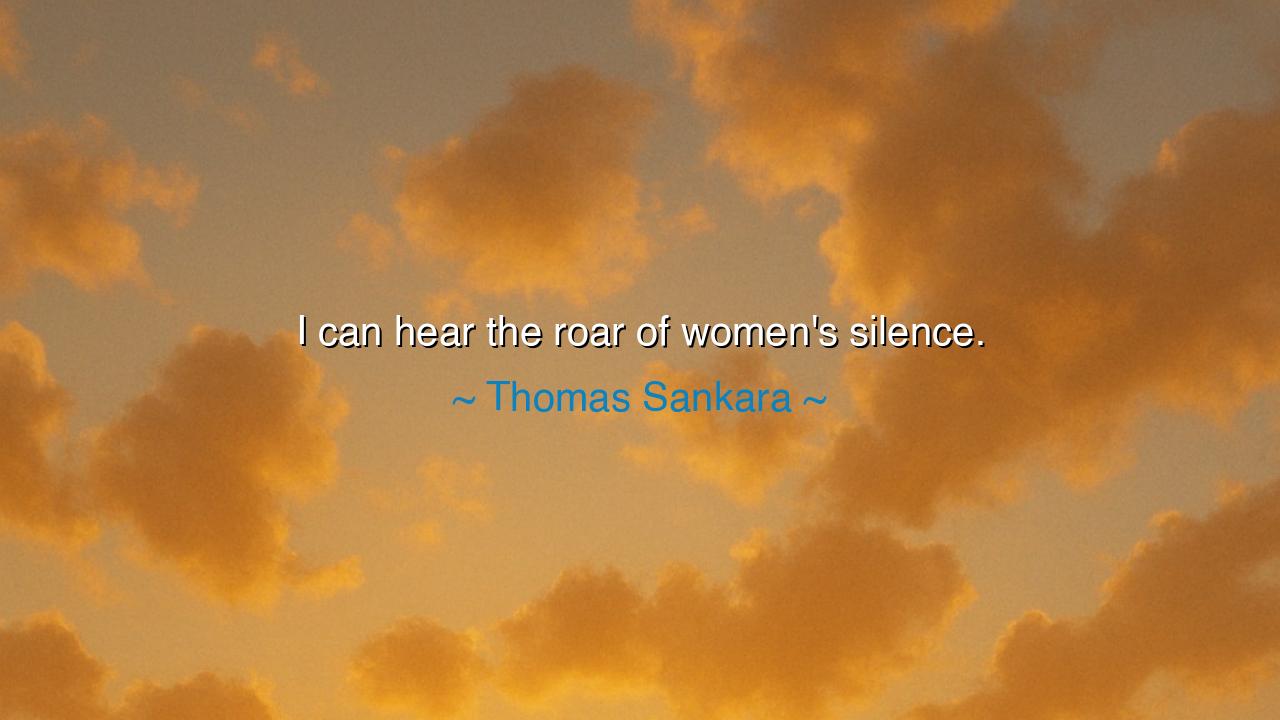
I can hear the roar of women's silence.






The words of Thomas Sankara — “I can hear the roar of women’s silence.” — are at once poetic and prophetic. They unveil the paradox of power concealed: the silence of women, imposed by centuries of neglect and subjugation, is not emptiness but a gathering storm. To Sankara, the unspoken grief and unacknowledged strength of women resounded louder than any shouted protest. Their stillness was not weakness; it was the mighty roar of justice yet to break forth.
This utterance was born from the soil of Africa, where Sankara, the revolutionary of Burkina Faso, sought to lift the burdens laid upon women by custom and inequality. He saw with clear eyes that no nation could rise while half its people were bound in chains of silence. Thus his words call upon the world to hear what is not spoken, to discern the thunder hidden in quiet endurance. For silence itself can be a weapon, its weight crushing the conscience of those who would ignore it.
History bears witness to this truth. Consider the women of Sparta, who though they fought no battles with sword, wielded unshakable influence. When men marched to war, it was the women who commanded, “Return with your shield, or upon it.” Their silence in the public assembly was not submission, but a force shaping the spirit of warriors. Or recall the suffragettes of the modern age, whose silent marches filled the streets of cities with a power that no bullet could silence. What was once unspoken became the anthem of freedom.
The roar of silence is the voice of all who have been denied speech yet refuse to vanish. It is the cry of the oppressed, the patient endurance that builds into a tide too strong for walls to hold. To hear it, as Sankara did, is to know that silence is not absence, but presence — presence made all the more formidable because it has long been restrained. When it finally breaks forth, it shakes empires.
Let the generations remember: never dismiss silence, for within it often lies the greatest strength. The whisper of the unacknowledged, the stillness of the oppressed, these are not voids but seeds of revolution. To hear the roar of silence is to glimpse the justice to come, to feel the earth tremble with the footsteps of those who will not remain hidden. Thus Sankara’s words endure — a summons to listen, to rise, and to honor the strength that has too long been unheard.






NDNgoc Diep
Sankara’s quote brings attention to the silence that women often experience, whether due to societal pressures, fear, or lack of opportunity. But does silence necessarily equate to power? Could it also be a sign of fear or resignation in the face of systemic injustice? How do we support women in transforming their silence into visible change, ensuring their voices are heard, not just in moments of protest, but in every part of society?
KTKim Thuong
Thomas Sankara’s words resonate with the idea that silence is not always passive. Women’s silence can be a cry for justice, a reflection of being unheard or oppressed, or a strategic move in a larger fight. How do we ensure that the silence of women doesn’t go unnoticed or unaddressed? What steps can be taken to create spaces where women feel empowered to speak up, without fear of losing their voice or identity?
HNHung Nguyen
The concept of 'the roar of women's silence' is deeply thought-provoking. It suggests that when women are not allowed to speak, their silence is loud and powerful in its own way. How does this relate to the historical and ongoing struggle for women's voices to be heard? Is there a way we can amplify the power of women's silence into action, so it’s no longer something to be feared or ignored?
ATAnh Thi
Sankara’s statement makes me think about the weight of silence in certain cultures. Sometimes, silence can be a sign of resilience, patience, or even rebellion. But how often is women’s silence misinterpreted as weakness, when it may actually represent strength or defiance? What can we do to change the narrative and encourage more open spaces for women to express themselves without fear of judgment or retaliation?
HHackers
Thomas Sankara’s quote is a powerful reflection on the often-overlooked strength in silence. When women are silent, it can speak volumes about their oppression, suppression, or the expectations placed on them. How often do we ignore or dismiss women's silence as mere passivity, when in reality, it may be the loudest statement of all? How can we better listen and understand the silent voices of women, especially in societies where they are not encouraged to speak up?